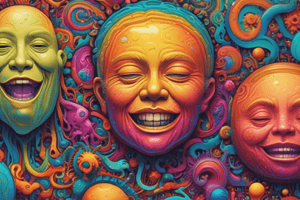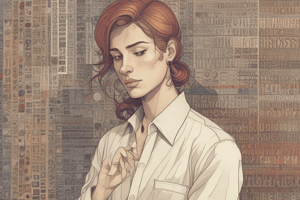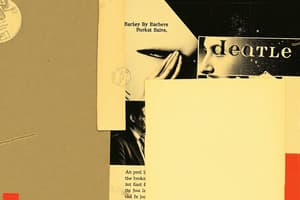Podcast
Questions and Answers
What is the correct base form of the verb used in the present subjunctive for the verb 'to have'?
What is the correct base form of the verb used in the present subjunctive for the verb 'to have'?
- have (correct)
- has
- having
- had
In which condition type is the structure 'If + past perfect, would have + past participle' used?
In which condition type is the structure 'If + past perfect, would have + past participle' used?
- Type II Conditionals
- Type IV Conditionals
- Type I Conditionals
- Type III Conditionals (correct)
Which of the following sentences exemplifies the usage of the past subjunctive in a conditional statement?
Which of the following sentences exemplifies the usage of the past subjunctive in a conditional statement?
- If they were to arrive, we would celebrate.
- If I were a king, I would rule wisely. (correct)
- If he has time, he would join us.
- If she was here, she would help.
Which author is noted for utilizing the subjunctive to convey longing and uncertainty in their poetry?
Which author is noted for utilizing the subjunctive to convey longing and uncertainty in their poetry?
What is a common structure for expressing a wish using the subjunctive mood?
What is a common structure for expressing a wish using the subjunctive mood?
Flashcards are hidden until you start studying
Study Notes
Subjunctive Mood
Form and Structure
- Present Subjunctive:
- Base form of the verb (e.g., "be," "have," "go").
- Used after certain verbs and expressions (e.g., "suggest," "recommend," "if only").
- Past Subjunctive:
- Typically formed with "were" for all subjects (e.g., "I were," "he were").
- Used in hypothetical situations and contrary-to-fact statements.
- Future Subjunctive:
- Less common; often expressed using modal verbs (e.g., "would").
- Common Structures:
- “If + subject + past subjunctive, subject + would + base verb.”
- “Subject + base verb + that + subject + base verb.”
Usage in Conditional Sentences
- Type II Conditionals (Unreal Present/Future):
- Structure: "If + past subjunctive, would + base verb."
- Example: "If I were rich, I would travel the world."
- Type III Conditionals (Unreal Past):
- Structure: "If + past perfect, would have + past participle."
- Example: "If I had known, I would have called."
- Expressing Wishes and Desires:
- Use of subjunctive to indicate wishes: "I wish he were here."
Examples in Literature
- Shakespearean Works:
- Frequent use of subjunctive in plays to express wishes and hypothetical scenarios (e.g., “If I were a rich man...”).
- Emily Dickinson:
- Utilizes the subjunctive to convey longing and uncertainty in poems.
- Modern Literature:
- Contemporary authors often employ subjunctive in narratives to explore themes of regret and desire (e.g., “If only she had...”).
Subjunctive Mood
Form and Structure
- Present subjunctive employs the base form of the verb, such as "be," "have," and "go."
- Often follows specific verbs and expressions like "suggest," "recommend," and "if only."
- Past subjunctive is formed using "were" for all subjects, e.g., "I were," indicating hypothetical or contrary-to-fact scenarios.
- Future subjunctive is less frequently recognized, usually expressed with modal verbs such as "would."
- Common structures include:
- "If + subject + past subjunctive, subject + would + base verb."
- "Subject + base verb + that + subject + base verb."
Usage in Conditional Sentences
- Type II conditionals convey unreal present or future situations, following the structure "If + past subjunctive, would + base verb."
- Example: "If I were rich, I would travel the world."
- Type III conditionals reflect unreal past situations, structured as "If + past perfect, would have + past participle."
- Example: "If I had known, I would have called."
- Subjunctive mood is utilized for expressing wishes and desires, such as in "I wish he were here."
Examples in Literature
- Shakespeare often employs the subjunctive to illustrate wishes and hypotheticals, e.g., “If I were a rich man...”
- Emily Dickinson uses the subjunctive to portray themes of longing and uncertainty within her poetry.
- Modern literature frequently incorporates the subjunctive to discuss regret and desire, as seen in phrases like “If only she had...”
Studying That Suits You
Use AI to generate personalized quizzes and flashcards to suit your learning preferences.




